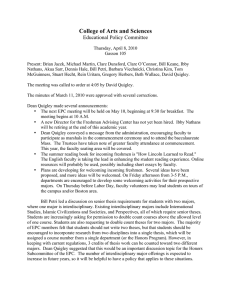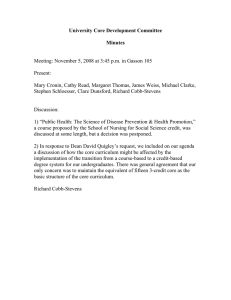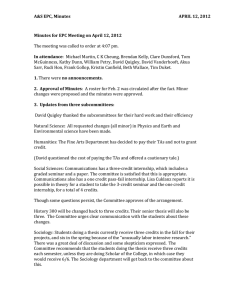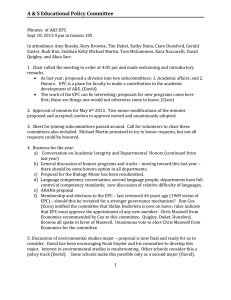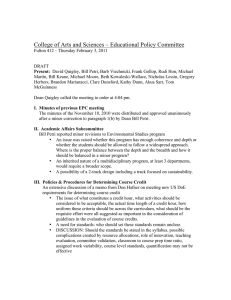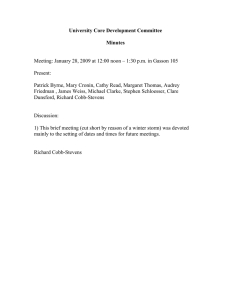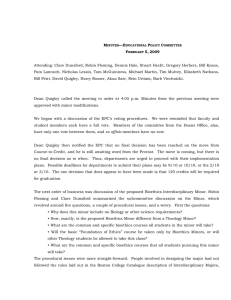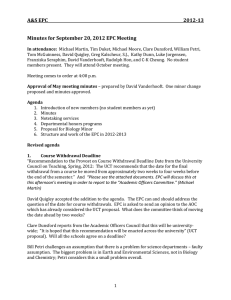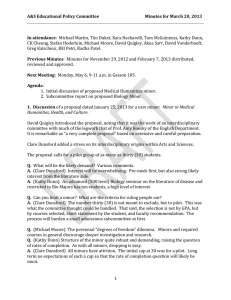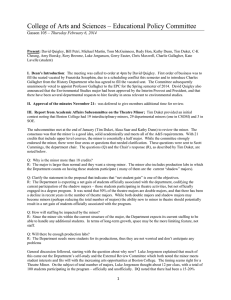A&S EPC MAY 7th 2012 1
advertisement
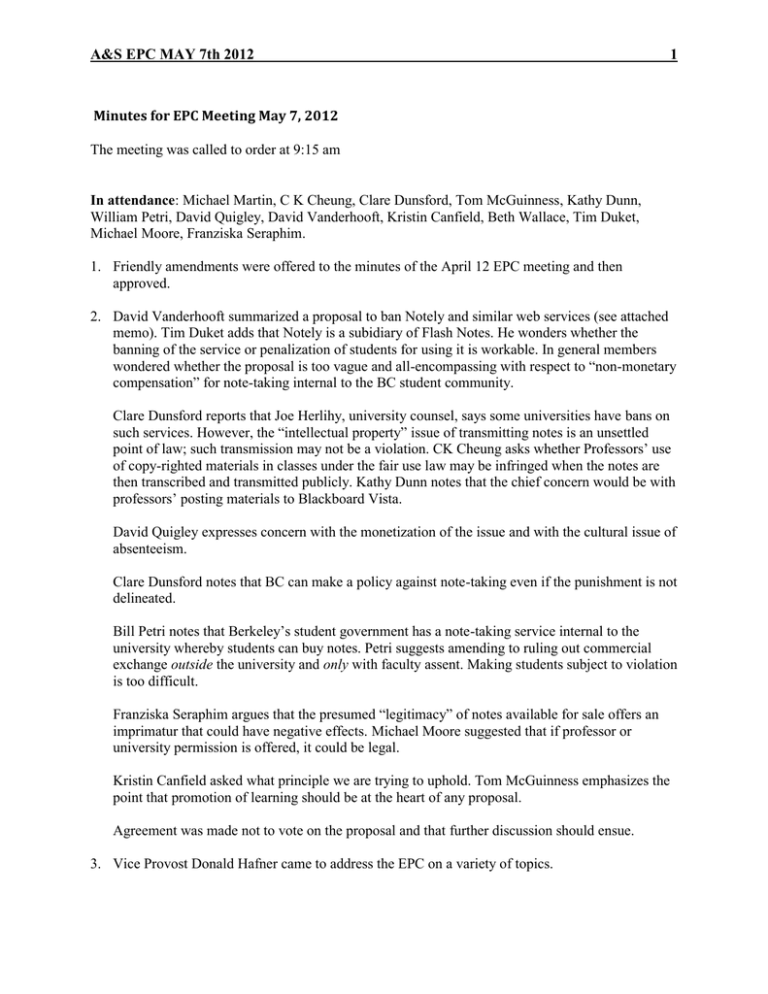
A&S EPC MAY 7th 2012 1 Minutes for EPC Meeting May 7, 2012 The meeting was called to order at 9:15 am In attendance: Michael Martin, C K Cheung, Clare Dunsford, Tom McGuinness, Kathy Dunn, William Petri, David Quigley, David Vanderhooft, Kristin Canfield, Beth Wallace, Tim Duket, Michael Moore, Franziska Seraphim. 1. Friendly amendments were offered to the minutes of the April 12 EPC meeting and then approved. 2. David Vanderhooft summarized a proposal to ban Notely and similar web services (see attached memo). Tim Duket adds that Notely is a subidiary of Flash Notes. He wonders whether the banning of the service or penalization of students for using it is workable. In general members wondered whether the proposal is too vague and all-encompassing with respect to “non-monetary compensation” for note-taking internal to the BC student community. Clare Dunsford reports that Joe Herlihy, university counsel, says some universities have bans on such services. However, the “intellectual property” issue of transmitting notes is an unsettled point of law; such transmission may not be a violation. CK Cheung asks whether Professors’ use of copy-righted materials in classes under the fair use law may be infringed when the notes are then transcribed and transmitted publicly. Kathy Dunn notes that the chief concern would be with professors’ posting materials to Blackboard Vista. David Quigley expresses concern with the monetization of the issue and with the cultural issue of absenteeism. Clare Dunsford notes that BC can make a policy against note-taking even if the punishment is not delineated. Bill Petri notes that Berkeley’s student government has a note-taking service internal to the university whereby students can buy notes. Petri suggests amending to ruling out commercial exchange outside the university and only with faculty assent. Making students subject to violation is too difficult. Franziska Seraphim argues that the presumed “legitimacy” of notes available for sale offers an imprimatur that could have negative effects. Michael Moore suggested that if professor or university permission is offered, it could be legal. Kristin Canfield asked what principle we are trying to uphold. Tom McGuinness emphasizes the point that promotion of learning should be at the heart of any proposal. Agreement was made not to vote on the proposal and that further discussion should ensue. 3. Vice Provost Donald Hafner came to address the EPC on a variety of topics. A&S EPC MAY 7th 2012 2 Hafner spoke about the vexing issue of grade compression. The problem of whether grade quotas or mandates for faculty can be effective came under discussion. The emphasis of Hafner and Quigley was on conversation among faculty and setting new expectations. Hafner suggests breaking out faculty grades for review by all faculty within departments. Numerous comments in favor of more conversation and enhancing the university’s “will” to address the problem. Wide ranging discussion ensued. Hafner also reported on liaison work between Student Affairs and the academic side of the university, which can be enhanced. Students appreciate conversations with faculty outside of the classroom. Three other collaborative initiatives have come from consideration of such matters: o sophomore residential learning communities. Some of this happens already. o faculty can work with student affairs to promote experiential components for courses o have faculty in clusters of courses on a related topic (race, sustainability, e.g.) encourage more discussion groups fostered by a faculty member and someone on the student affairs side. Kristin Canfield notes that some res life space constraints and housing demands affect the feasibility of the learning communities. Clare Dunsford notes that these could be excellent ways to develop 1 and 2 credit classes. Tom McGuiness asks about whether faculty compensation for additional time spent teaching needs to be discussed. 4. Bob Murphy from International Studies came to discuss the issue of International majors doing double majors. he notes that in principle the double major option seems not to make great sense, and perhaps should be banned with other interdisciplinary major. language double majors, however, can make very good sense and that option has been chosen by students. This should be allowed, Murphy argues. Econ, Poli Sci can be more conventional (like History, Theology, English) and workable. Others perhaps ruled out. Quigley asks whether students should be allowed to double major with ICS, but Murphy thinks not. Others inquired whether students were now being harmed or helped by the double major option. 5. Kathy Bailey of Islamic Civilizations and Societies also came to discuss double majoring. ICS/IS double major IS coherent, thus disagreeing with Murphy. attractive to graduate schools and employers. double major is demanding and rigorous and thus attracts bright and engaged students who can handle it. 34 total ICS majors. 18 straight ICS majors. Two ICS/IS double majors. 12 have double major with Poli Sci. student experiences and Kathy’s own undergrad life at BC leads her to favor the double major Kathy Dunn and CK Cheung ask about how advising is structured to help students figure out course and other decisions. Kathy Bailey answers that advising is very intensive.Clare A&S EPC MAY 7th 2012 Dunsford asks whether there is a lot of co-counting of courses and also about how thesis requirements work. Respectfully submitted by David Vanderhooft. 3
